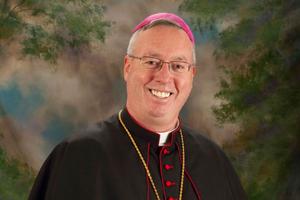Civil Rights for the Unborn
College Students Who Are Passionate About Life

The pro-life fruits of a college with a solid Catholic identity are always on display in the dead of winter in Washington.
In the bitter cold of a January day, a throng of thousands of students marched.
These were mostly youth, a mix of high school and college students, led by Benedictine College in Atchison, Kan.
The Benedictine students carried the banner at the forefront of the annual March for Life in the nation’s capital to fight for the pro-life cause.
And according to some marchers who led their colleges in the event at the start of 2014, the tide is changing with this generation.
Benedictine is one of the leaders of this movement, not only literally leading the march this past year, but also figuratively. The college sent a record eight buses — about 430 people — to Washington.
Kathryn Brown, a senior, coordinated the school’s trip.
“The students took pride in it. We’re willing to take it to the public square,” Brown said. “The youth are the ones getting involved, and they’re beginning to tailor [the march] to the youth.”
Brown is committed to pro-life efforts because of the march: “Seeing all the people there struck me, and I felt like God was calling me to get involved. Our generation is realizing that a lot of our generation is missing. That’s hitting us more as we get older.”
Laura Peredo, a junior, is the president of Benedictine’s Ravens Respect Life group. She agrees that this generation is realizing how serious abortion is.
“We’ve seen the damage done in people. During our lifetime, we’ve seen a record number of pro-life laws passed. I’ve been blown away with the people called and equipped to be a part of this movement,” Peredo said. “It’s the civil-rights issue of our day. I want future generations to know we didn’t let abortion happen without a fight.”
“There are so many women sharing their stories, and that’s really powerful. You can’t argue with stories,” she added. “Our viewpoint is becoming recognized more with young people. I like to tell young people, ‘We’re the future generation, but don’t discount what young people can contribute. Don’t be afraid to do something; we are the here and now. We have a future too, but we are here now.’”
Ravens Respect Life — which was started by Bishop Andrew Cozzens of the St. Paul and Minneapolis Archdiocese when he was a Benedictine student — has grown to be a “very strong group,” according to Stephen Minnis, Benedictine’s president.
Minnis said that he is “very proud” of the students’ leadership with the cause.
“All you have to do is go to the March for Life to see this is a young person’s movement — that’s what gives you hope about the future,” Minnis said.
“The young people really believe that the movement is the civil issue of the day. … Our students are willing to get on buses and fight for the civil rights of the unborn,” he continued.
Benedictine isn’t the only college turning the tide of the movement.
“I think more [young] adults are becoming more aware,” said Bailey Wright, president of Students for Life at the University of Michigan-Flint. “We’re more active as a generation. There’s still a road ahead of us, but we’re really going in the right direction.”
Wright, a junior, said a class project prompted her to become involved in pro-life work: “I did a debate on it my freshman year and did a lot of research on it: just the straight-up science of it, that life begins at conception. This is so straightforward. ... A lot of what we fight is indifference and lack of knowledge.”
While the pro-life movement seems to be gaining momentum with the young-adult generation, the “how” is just as important as the cause itself.
Besides attending the march, students host events on campus to raise awareness of the cause, including National Remembrance Day for the Unborn in September, where students spent a special day in prayer.
This past year at Benedictine, Peredo was in contact with the organization 50 Million Names, which is promoting the naming of aborted children — who now number more than 50 million. The marchers named unborn babies on the buses, collecting them in a binder at the end.
“It was a very unique event and made it very real,” Peredo said. “You could see how powerful it was for the students, and it was a good way to recognize what abortion actually does.”
Wright said that, in Flint, students do a day of solidarity in October, spending the day in silence with a red band on their arms, passing out flyers to other students about the cause.
However, the culture can’t be changed with only marching and events.
Without compassion, passion means little, Wright explained.
“I love that ‘passion’ is in ‘compassion.’ … Our greatest moments are when we show compassion,” Wright said.
Stephanie Kaefer, a junior, who is president of Students for Life at St. Louis University, agreed.
“To make the best impact, you have to be receptive of other people,” she said. “You have to respect and listen to them. We are ‘Students’ for Life — we don’t have all the answers, but we do what we can. You can advocate for life by being a supportive friend” while witnessing for life.
Therese Aaker is the alumni communications specialist for
Fellowship of Catholic University Students.
She writes from Lakewood, Colorado.
- Keywords:
- Sept. 21-Oct. 4, 2014
















